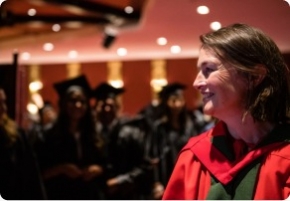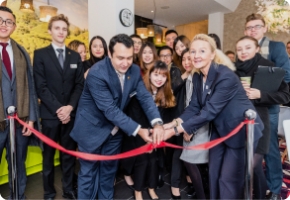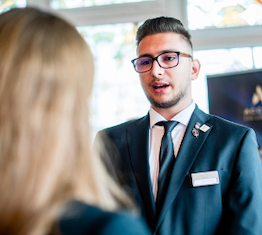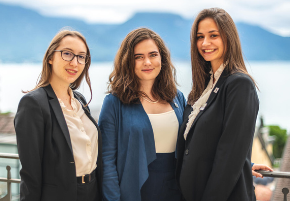- About
- Programs
- Campus Life
- Career Services
- Admissions
- News & Events
- Alumni
4 ways of considering innovation beyond technology in higher education
4 ways of considering innovation beyond technology in higher education
From curriculum development and course content, to research and assessment of students, innovation is core to our educational approach at Hotel Institute Montreux.
The year 2020 will be certainly be remembered. While COVID-19 has forced educational institutions to rethink their teaching methods and communication tools, I don’t just mean Zoom, Microsoft Teams, gamification, or online simulations. Innovation in education is more than just increasing the use of technology– it is, above all, a mindset. Here are four key non-technological innovations we have embraced at Hotel Institute Montreux:
1. Innovation in Course Content
One of the reasons our students love Hotel Institute Montreux is because during the second year of their bachelor’s program, they have the opportunity to choose a specialization. We know that hospitality is not limited to hotels and restaurants: wherever there is a client, there is hospitality. In October 2020 we launched our new specialization, Management for the Senior Living Industry, which was welcomed with enthusiasm by students.
By 2060, almost one third of all Europeans will be over 65 years old. On average, our seniors live longer, maintain better health, and have greater purchasing power than previous generations of retirees. These baby boomers travel, play sports, and have hobbies. They are active and looking for tailor-made solutions to meet their needs.
2. Innovation in Research
HIM is above all a vocational school; we do not have a research center. This does not, however, stop us from analyzing, comparing, and trying to understand the world around us. An example of this is our innovative Generation Z research project, where students are both the subject of study and the researchers.
3. Innovation in Measuring Impact
Like all schools, our teachers grade students. However, at Hotel Institute Montreux our biggest focus isn’t on students getting straight As, but rather the evolution of each student in relation to the development of their knowledge, emotional intelligence, creativity, critical thinking, agility, and obviously the fact that they are customer-oriented in all that they do. This is all about the development of their hospitality quotient, and is now another way for us to evaluate them and measure their progress.
4. Innovation in Curriculum Development
Like most hospitality management schools, our students start their education with an Introduction to Hospitality course. This year, part of their final grade is linked to an interview project with Hotel Institute Montreux alumni.
Thanks to the active collaboration of our former students occupying managerial positions in hotels around the world, our students have been able to gain personal insights into what a career in the international hospitality industry means. At the same time, they have developed their network, were able to practically link information seen in class with the real world and have learnt how to use LinkedIn as a means of communication.
Thanks to this innovation, this ‘traditional’ course has now become a highlight of the first trimester for students at Hotel Institute Montreux. To find out more, follow our Hotel Operations Management Program Leader, Michael Heinrich on LinkedIn and #hospitalitystories on Instagram.
#Academics











